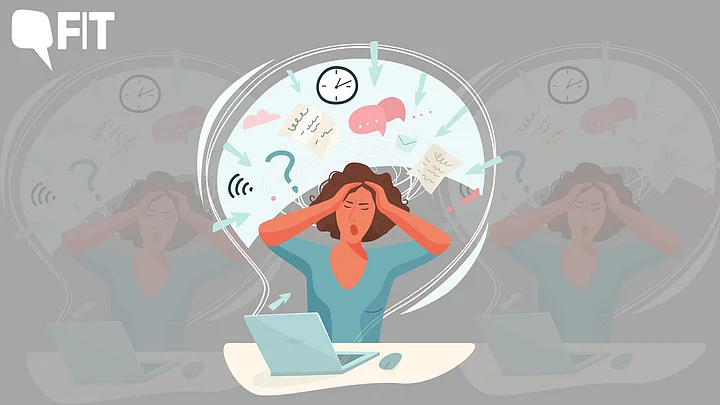Our body has five senses – light, sound, taste, touch, and smell. Each of them have an equally important role to play, but what if any one of these feel way too overwhelming to handle?
This elevation of senses, also known as sensory overload, can affect our daily lives in many ways while meddling with how we function.
FIT spoke to Dr Vinit Suri, Senior Consultant, Neurology, Indraprastha Apollo Hospitals, New Delhi, and Dr Sandeep Govil, Senior Consultant - Psychiatry, Max Super Speciality Hospital, Shalimar Bagh, to understand this better.
What Is Sensory Overload?
"Sensory overload is a condition in which an individual's senses are overstimulated by the environment or stimuli around them. This can happen when there is an excessive amount of sensory input, or when an individual is unable to filter out irrelevant sensory information."Dr Vinit Suri, Senior Consultant, Neurology, Indraprastha Apollo Hospitals, New Delhi.
It can be caused by a variety of factors, such as loud noises, bright lights, crowded spaces, strong smells, or certain textures.
Dr Suri says "People with certain conditions, like those on the autism spectrum or have sensory processing disorder, may be more prone to experiencing sensory overload."
In these cases, the individual's sensory processing abilities may be different from those of neurotypical individuals, making it more difficult to filter out sensory information and regulate their response to it.
How Does It Meddle With Everyday Life?
"The severity of the impact of sensory overload on a person's daily life can vary widely depending on the individual and the context in which it occurs," Dr Suri says.
For some people, sensory overload may be a mild inconvenience that only occurs in certain situations, while for others it can be a significant barrier to participating in everyday activities.
"It's important to note that while sensory overload can be a symptom of certain mental health conditions, not everyone who experiences sensory overload has a mental health disorder. Sensory overload can also be a normal response to certain situations, such as a loud concert or crowded room."Dr Vinit Suri, Senior Consultant, Neurology, Indraprastha Apollo Hospitals, New Delhi.
What Are the Symptoms Of Sensory Overload?
The symptoms of sensory overload can vary depending on the individual and the context in which it occurs. However, some common symptoms can look like:
Difficulty concentrating: Sensory overload can make it hard to focus on tasks, process information, or complete activities.
Feeling overwhelmed or anxious: The excessive sensory input can lead to feelings of overwhelm, anxiety, or panic.
Physical discomfort: Overstimulation of the senses can cause physical discomfort, such as headaches, nausea, or dizziness.
Difficulty with coordination or balance: Sensory overload can affect spatial awareness and lead to difficulties with coordination or balance.
What Are the Causes?
"Usually, sensory overload occurs when the brain struggles to interpret, prioritise, or otherwise process sensory inputs. It then communicates to the body that it is time to escape these sensory inputs," says Dr Sandeep Govil. This message causes feelings of discomfort and panic.
Dr Govil also tells us that in some people who experience sensory overload regularly, such as those with a sensory processing disorder, there may be a biological basis for these processing problems.
One study indicates that children with sensory processing disorder have quantifiable differences in their brain structure. The researchers suggest that this points to a biological basis for sensory processing problems.
How Can One Control Frequency Of Sensory Overload?
Several strategies can help manage and reduce the frequency of sensory overload. Here are some tips, according to experts.
1. Identify triggers: Pay attention to situations or stimuli that trigger sensory overload, and try to avoid or modify them when possible. For example, wearing noise-canceling headphones in a loud environment or using dimmer lighting in a room may help reduce sensory overload.
2. Practice self-care: Engage in regular self-care practices, such as exercise, meditation, or deep breathing, to reduce stress and promote relaxation.
3. Use sensory tools: Experiment with sensory tools or techniques, such as weighted blankets, fidget toys, or deep pressure, to help regulate the sensory system and reduce sensory overload.
4. Seek support: Connect with a healthcare provider or mental health professional who specialises in sensory processing differences or conditions, such as autism or sensory processing disorder, to develop personalized strategies and receive support.
5. Consider therapy: Participate in therapy or counseling to address any underlying mental health conditions or concerns that may contribute to sensory overload, such as anxiety or PTSD.
6. Develop coping skills: Work with a mental health professional to develop coping skills, such as mindfulness, cognitive-behavioral therapy, or exposure therapy, to manage symptoms and improve overall functioning.

